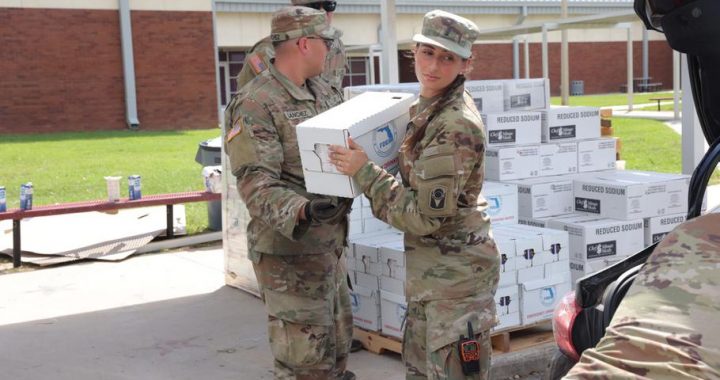Major Cuts to Cost-of-Living Allowances for Thousands of Military Families in Germany Coming This Summer
3 min read
A U.S. Air Force Airman selects produce while grocery shopping at Ramstein Air Base, Germany, May 17 2022.
Thousands of service members and their families stationed in Germany will see a major hit to their cost-of-living allowances starting next month, despite continued struggles for Americans living overseas with heightened utility costs and economic strain caused by Russia’s invasion of Ukraine.
The Pentagon announced Wednesday that there will be a reduction in the overseas cost-of-living allowance — otherwise known as COLA — for families in the Kaiserslautern Military Community starting June 1 because prices in the continental United States are now more expensive than those in Germany.
Senior leaders are aware that this is poor timing for a reduction in rate, and are working to determine a way forward,” Lt. Col. Micah Neece, the 86th Comptroller Squadron commander at Ramstein Air Base, said in a statement.
With approximately 50,000 service members and families, Kaiserslautern is the largest military community outside the continental United States
The decrease in the monthly allowance depends on rank, years of service and number of dependents. But an unverified email circulating online that appears to be from the 86th Airlift Wing out of Ramstein explaining the decrease to base commanders describes a cut in the COLA between “$200 and $500” for some service members.
Spokesmen for the Air Force, Army and Pentagon did not immediately return a request for comment asking about the email and the cost-of-living decrease.
The Kaiserslautern Military Community is made up of Air Force facilities located at Ramstein, Einsiedlerhof, Pirmasens, Vogelweh and Kapaun Air Station, along with Army facilities at Sembach, Kleber, Panzer and Daenner Kasernen; Landstuhl; Kirchberg; Miesau Depot; Kaiserslautern Industrial Center; Rhine Ordnance; and Pulaski Barracks.
The non-taxable COLA allowance exists to make living in these areas more affordable for service members by offsetting the cost of daily expenses to make them comparable to costs stateside. With rising prices in the United States, the gap has diminished, leading to the cuts.
“When the strength of the dollar increases against the euro, and as the cost of goods in the U.S. rise compared to the cost of goods in the Kaiserslautern Military Community, service members can expect COLA payments to decrease,” the release said.
Cost-of-living rates are also determined by input from service members and their families. The most recent increase in the Kaiserslautern Military Community was based on a survey from the fall of 2021, well before Russia’s invasion of Ukraine and widespread inflation in the U.S.
Two surveys determine the relative cost of living overseas: the Living Pattern Survey, which happens every three years and asks where and how families purchase goods, and the Retail Price Schedule, which is conducted every year and collects prices for groceries, car insurance, gasoline, and day care.
Fears are also growing that Russia may cut off the gas supply to Europe. Germany depends on Russia for 40% of its gas supplies, according to Bloomberg, and utility hikes in the country, as well as across Europe, have spiked since the invasion.
The Pentagon, however, said service members should rely on their utility allowances instead of their cost-of-living funds to address the price hikes.
“Although we have seen [a] significant increase in utility costs as a result of the conflict in Ukraine, COLA surveys also do not account for utility costs. Members receive a utility allowance to address utility costs,” the Pentagon said in a press release.
Backlash to news about COLA decrease was swift online, especially on the popular Air Force amn/nco/snco Facebook page.
“It blows my mind how they can just change how much money we get at the drop of a hat,” one commenter wrote. “If it was $50 I wouldn’t complain. But I am talking HUNDREDS of dollars a month.”
The Pentagon, however, said in its press release that service members and their families shouldn’t count on COLA being consistent each month.
“Since COLA is not a fixed amount and fluctuates annually as well pay period to pay period, Defense Department officials continually stress that fixed expenses such as rent and car payments should be based on what a service member can afford without COLA,” the Pentagon wrote.





